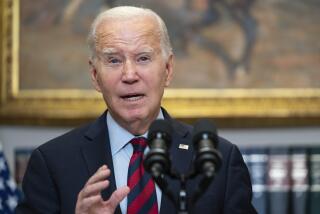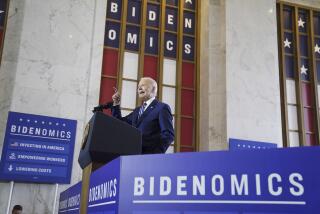McManus: Obama’s plan to avoid lame-duckery

- Share via
For the last two months, President Obama has been mired in Washington’s inside game, caught up in backroom congressional politics as he tried unsuccessfully to pass a bill on gun control and nudge Republican senators toward compromise on the budget.
But do his losses mean, as some pundits suggest, that, four months into his second term, the president is already a lame duck?
The answer may depend on the mood far outside the capital.
This week, the president is leaving town to launch what the White House, reverting to campaign mode, is calling a “middle-class jobs and opportunities tour.” First stop: Austin, Texas, where high-tech manufacturing has produced real recovery, if not quite a boom.
The outing is a time-honored gambit for recruiting help from outside the Beltway. As Obama noted last week, in response to a reporter who asked if he had run out of “juice”: “I cannot force Republicans” to compromise on taxes and spending, but “I can put pressure on them; I can rally the American people.”
Unlike Lyndon B. Johnson, who was a master of bestowing or withholding favors when he needed something from Congress, Obama doesn’t have much leverage with his foes on Capitol Hill. In the conservative-run House of Representatives, the most powerful members in the Republican majority don’t yearn for favors from the White House. As Obama noted recently, “Their base thinks that compromise with me is somehow a betrayal.”
But like any moderately popular president, Obama has a tool that isn’t available to leaders in Congress: the bully pulpit. And despite all the fretting in Washington about the president’s lost momentum, he hasn’t lost much stature in the electorate as a whole.
On election day last year, Obama’s job approval rating in the Gallup poll stood at 50%, high enough to win him a second term; last week, Obama’s job approval remained steady at that same 50%. Meanwhile, Congress’ approval rating has remained steady too — but at 15%.
Now Obama is hoping to shore up his greater popularity by recommitting himself visibly to the issues voters care about most: the economy and jobs.
The agenda Obama laid out in his State of the Union address included a wish list of job-related items: $50 billion for spending on roads, bridges and other infrastructure projects; programs to promote manufacturing, including better job training; a big new push for early childhood education; and a hike in the minimum wage from $7.25 to $9 an hour.
“These are the kind of ideas we want to lift up, so people understand they are policy priorities of the president’s,” White House spokesman Josh Earnest said Sunday.
That spending-heavy wish list has been dismissed as unrealistic in an era of budget-cutting, and it probably is. But that’s not the point. Those items have another purpose: They ensure that Obama is talking about job-creation in ways ordinary voters can grasp.
As GOP pollster David Winston points out, “What people want to hear is a credible plan for fixing the economy and creating jobs.”
The winner in most elections — at least during periods of economic distress — is the side that has the most convincing jobs proposals. And Obama is all too aware that his best shot at avoiding lame-duckery — helping the Democrats retake the House in 2014 — is, at this point, a long shot.
That doesn’t mean he’ll abandon the “inside game” strategy of trying to woo Republicans in the Senate toward a grand bargain on taxes and spending.
Instead, not surprisingly, he’s trying to pursue both strategies at once: the inside game of Washington negotiations and the outside game of marshaling public support for both his policies and remaking Congress.
On Monday, he spent a day on the golf course with two GOP senators who could be key to any deal, Bob Corker of Tennessee and Saxby Chambliss of Georgia. (Chambliss scored a hole in one on the 11th, a first in the history of presidential budget negotiations.)
Obama appears to have overestimated the degree to which his reelection would change Republican behavior. On gun control, taxes and perhaps even immigration, much of the GOP is still captive of its conservative base, bent on denying him any measure of success.
The president still hopes for a win on immigration, and he’ll take a second run at both gun control and a grand bargain on the budget. But he’s also adjusting his game to take that stubbornness into account. Taking senators to dinner and the golf course hasn’t borne any visible fruit yet. But relaunching the permanent campaign, and reminding the GOP that elections will keep happening every two years, just might help.
Follow Doyle McManus on Twitter @DoyleMcManus
More to Read
A cure for the common opinion
Get thought-provoking perspectives with our weekly newsletter.
You may occasionally receive promotional content from the Los Angeles Times.











